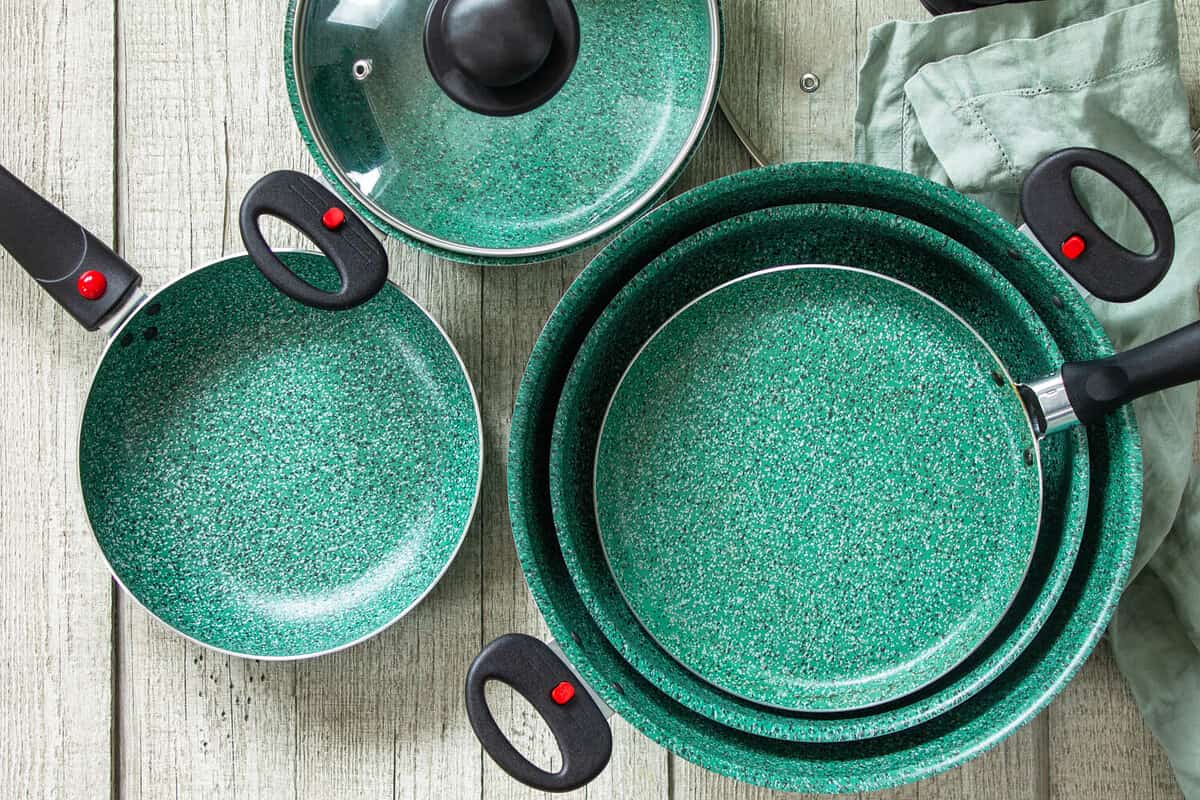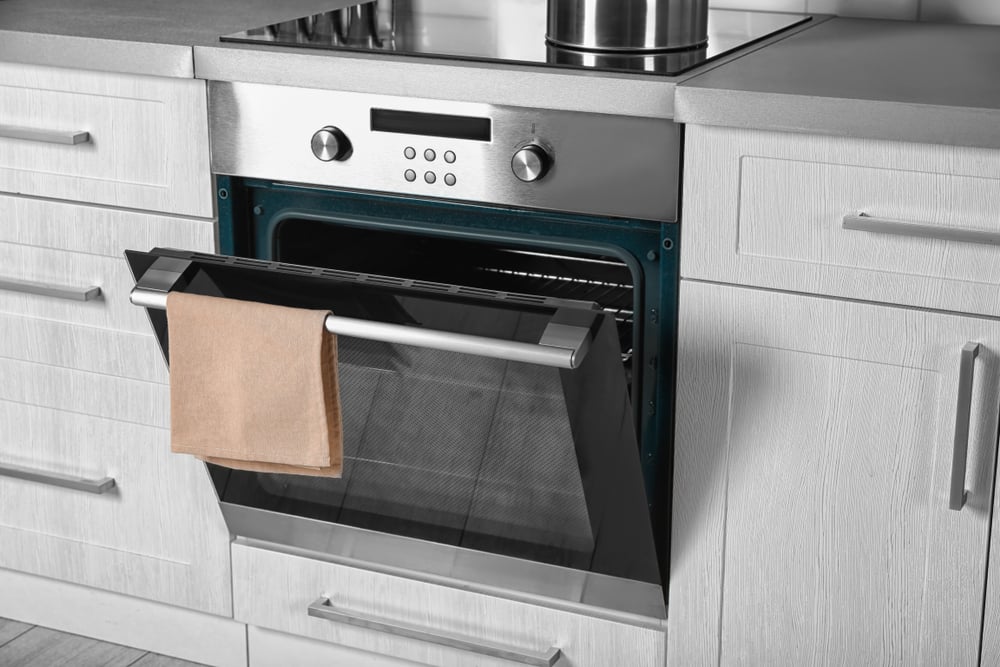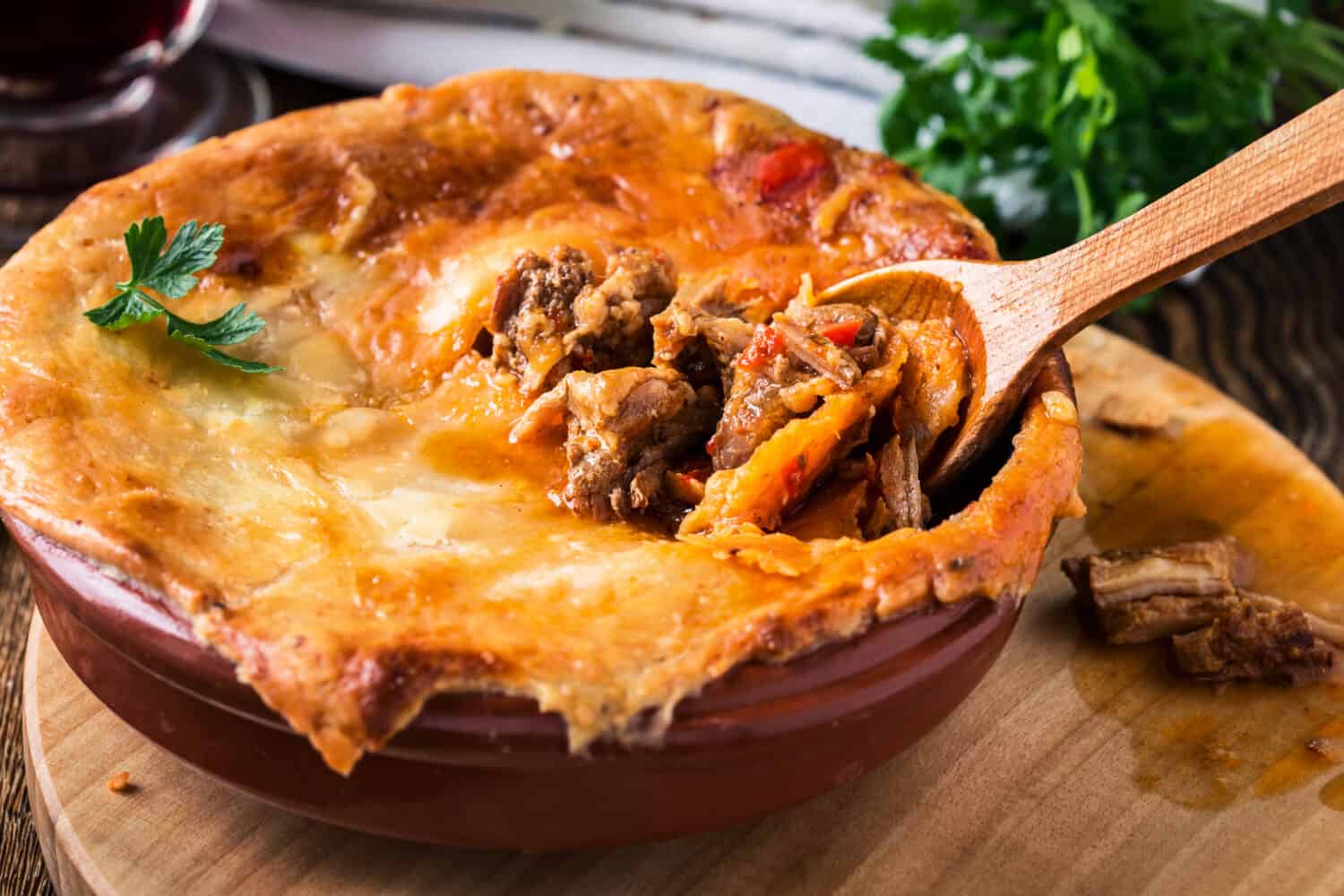Mastering cooking techniques in the kitchen starts with finding the most effective and efficient cookware. If you’ve ever considered the difference between cookware such as aluminum vs. ceramic, you may be searching for the best oven-safe cookware for your kitchen.
While ceramic and aluminum cookware have many differences, the main differences are the thermal conductivity and reactivity of the material. Compared to aluminum cookware, ceramic cookware has low thermal conductivity so it takes longer to heat up, but it cooks more evenly and retains heat longer. Many consider aluminum to be the best cookware for beginners because it’s simple to use.
- The must-have convenient reference guide for every home cook!
- Includes more than 8,000 substitutions for ingredients, cookware, and techniques.
- Save time and money on by avoiding trips to grab that "missing" ingredient you don't really need.
Whether you choose ceramic or aluminum cookware, they are both useful in different ways. Keep reading to find out which one might be right for you.

One of the benefits of ceramic cookware is its appearance.
©Elena Hramova/Shutterstock.com
Aluminum vs. Ceramic: What Is the Difference?
There are so many types of cookware to choose from and finding the right tools is an essential part of improving your skills in the kitchen. While you can use aluminum and ceramic for similar purposes, there are several differences between them.
Aluminum cookware is one of the most common types of cookware and is a great choice for beginners. Ceramic cookware could refer to fully ceramic or ceramic-coated cookware. Ceramic-coated cookware isn’t actually made out of full ceramic but is instead metal cookware with a ceramic-based nonstick coating.
The main difference between aluminum and ceramic tools is their thermal conductivity. Aluminum cookware is a better heat conductor, which means it heats up faster than ceramic. However, it also cools down quickly and ceramic is a better insulator.
The reactivity of the material is also something to consider. While aluminum is a reactive metal, ceramic cookware is non-reactive. When cooking with acidic ingredients in a reactive pan, it causes a chemical reaction, leading to the metal atoms being transferred to your food. This reaction can create a metallic taste or even an off-color to your food.
Main Difference Between Aluminum vs. Ceramic Cookware
If you’re looking into the differences between aluminum vs ceramic cookware, you might wonder which one is best for you. To help you decide, here are the main differences between them:
- Ceramic cookware is more durable
When comparing the two, ceramic is going to be the more durable. This is fitting since aluminum cookware is often more affordable and many consider it the most basic type of cookware. - Aluminum is a better heat conductor but won’t retain heat as long
Aluminum cookware is going to heat up much quicker than ceramic cookware, but it also won’t retain heat as long. Ceramic, however, will take a bit longer to reach the desired temperature but will also cook more evenly and stay warm for longer. - Ceramic cookware is great for use in the oven
If you’re looking for the best oven-safe cookware, ceramic is the right choice. While fully ceramic cookware is versatile enough to be safe in the oven, on the stove, or on the grill, aluminum cookware can go in the oven, but the effects are going to depend on whether there’s a specific coating on the pan. - Aluminum cookware might come with a nonstick coating
Aluminum cookware isn’t going to naturally be nonstick, but there is a possibility of your nonstick cookware being made of aluminum. If it is, the nonstick coating is typically a Teflon coating, which may raise concerns about health or safety since it’s made with synthetic materials.
No matter what your preferences are, there are both pros and cons to aluminum and ceramic cookware. Determining which one is best for you is going to depend on what your experience is in the kitchen.
What Is Aluminum Cookware?
Aluminum cookware is the most common type of cookware and is simple even for beginners. It sometimes comes in nonstick varieties, but you can also purchase a variety of types of pots, pans, or dishes made of aluminum.
Aluminum is considered a high-heat conductor, which means that it heats up quickly, although it may not cook as evenly as ceramic. Aluminum will heat up much faster than most other types of cookware. If you’re looking for simple, straightforward cooking, aluminum cookware usually does the trick.
What Is Ceramic Cookware?
Ceramic cookware generally refers to cookware made entirely of ceramic. This type is a more natural alternative to aluminum cookware and doesn’t include any synthetic materials in the coating. Ceramic cookware is incredibly versatile and can go from the stovetop to the oven with ease.
Some people choose ceramic cookware simply because of its appearance. Since ceramic comes with a glaze on the outside, it’s one of the only types of cookware that comes in a variety of beautiful colors. If you’re looking for cookware to match the rest of your kitchen, ceramic can be an excellent choice.
Ceramic vs. Ceramic-Coated Cookware
When it comes to ceramic cookware, it’s worth noting that this could refer to two different types of cookware. There’s fully ceramic cookware and ceramic-coated cookware. They both have different properties and it’s important to know the difference between them.
Ceramic cookware is non-toxic and doesn’t contain a non-stick coating or any metal. This type of cookware is incredibly durable and can be used in the oven, on the stovetop, or on the grill.
On the other hand, ceramic-coated cookware is made of metal but has a ceramic coating on it for nonstick properties. This cookware isn’t fully made of ceramic but can be an alternative to nonstick cookware made with Teflon coating.
While ceramic-coated cookware will often last longer than other nonstick types of cookware, it’s not as durable as cookware such as cast iron or stainless steel. Fully ceramic cookware will also be more durable than metal cookware that’s coated in ceramic.

Ceramic cookware is better for oven-safe cooking since it doesn't have a synthetic coating.
©Africa Studio/Shutterstock.com
Which Is Better for Oven-Safe Cooking: Aluminum or Ceramic?
Oven-safe cooking is another factor to consider when you’re searching for the right pots and pans. While most aluminum pans can go in the oven, ceramic is a better choice for oven cooking. It takes longer than aluminum to heat up, but ceramic provides more even cooking in the oven.
The safety of placing your aluminum cookware in the oven also depends on whether it has a nonstick coating or not. Ceramic cookware is safe to use at all temperatures, but aluminum cookware with a nonstick coating like Teflon is made with synthetic ingredients. According to Teflon, this coating is safe up until you reach 500 degrees F. While most people aren’t going to be cooking at this high of a temperature, it is something to consider because if it gets overheated, the Teflon coating can create toxic fumes that may make you sick.
Is Aluminum Cookware More Affordable Than Ceramic?
When comparing the cost of aluminum cookware vs. ceramic, aluminum is more affordable. Aluminum cookware is one of the most basic types and is great for beginners. You might choose aluminum because of its simplicity or affordability. However, the most affordable aluminum cookware isn’t always high quality. In this case, you often get what you pay for.
Ceramic cookware is going to be pricier than aluminum, but you’re also getting a higher quality product. While even ceramic cookware isn’t going to last you as long as cast iron or fully clad stainless steel will, it’s still more durable than aluminum if you care for it properly.
- The must-have convenient reference guide for every home cook!
- Includes more than 8,000 substitutions for ingredients, cookware, and techniques.
- Save time and money on by avoiding trips to grab that "missing" ingredient you don't really need.
Which Is Safer: Aluminum or Ceramic?
Safety is another factor to consider when it comes to the difference between two types of cookware like aluminum or ceramic. It’s safe to cook with both aluminum and ceramic, but if you want to choose a more natural option, ceramic may be the better choice for you.
The safety of the cookware comes down to the coating on it. While ceramic cookware is made fully of ceramic, aluminum cookware often has a nonstick coating on it. Additionally, ceramic-coated pots or pans are made of metal, but the cooking surface doesn’t have synthetic materials like Teflon nonstick coatings.
It’s also important to consider the reactivity of the material. Aluminum is a reactive metal, meaning if you cook with acidic ingredients for a certain period of time, atom metals can be transferred into your food. Ceramic, on the other hand, is non-reactive so you can cook with citrus or other acidic ingredients without worrying about a metallic taste.
Which Is Better: Aluminum vs. Ceramic
Aluminum and ceramic cookware have several major differences. If you’re wondering which cookware is better for you, consider how you’ll spend most of your time in the kitchen.
While aluminum cookware is better for beginners, ceramic cookware is a higher-quality product. Although ceramic costs a bit more than aluminum, it’s also more durable and versatile in the kitchen. If you’re looking for a cookware you can use in a variety of ways, consider trying out ceramic cookware for your next meal.
The image featured at the top of this post is ©istetiana/Shutterstock.com

